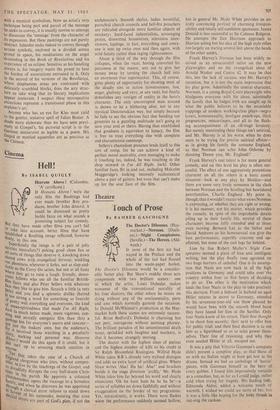Cinema
Hell!
By ISABEL QUIGLY IF Heavens Above! were the only film the Boultings had ever made (brother Roy pro- duces, brother John directs), it could be dismissed as pretty feeble farce on what sounds a promising subject for comedy.
But they have made other films you can't fail 10 take into account, better films that have established a Boulting image reflected, however (litnly, in this one. Superficially the image is of a pair of jolly 'satirists (moralists?) poking good clean fun at all sorts of things that deserve it, knocking down sacred cows with evangelical fervour, winkling out Phoniness wherever it lurks; not as slap-and- tickle as the Carry On series, but not at all fussy where they go to raise a laugh; friendly, demo- cratic fellows who use all the familiar Britigh- Tin faces and also Peter Sellers with whatever little} they like to give him. Scratch a little (a very unit) _ and you find a splenetic dislike (hatred Of t00 strong a word for something so liverish) of Pretty Pretty well everything and everyone, the kind Lineau-spiritedness that made I'm All Right, e" (a much better made, more vigorous, cun- Vrig, and morally energetic film than this) a er°age bin for everyone's sneers and rancour— orb just the makers' own, but the audience's, 1.1 r it involved those watching in a peculiarly nasty, narking and personal way. Heavens ju2. ye .1 ,Would do this again if it could, but it anyone. " isn't up to arousing much reaction in E„1-11, The film takes the case of a Church of nZand clergyman who tries, without compro- o de,' t° live by the teachings of the Gospel, and tian:eadfully disrupts the cosy half-dozen Chris- chin in his parish. He appoints a coloured fae.,,e, 'Warden, opens the vicarage to a homeless through a clerical error refuses to stand down cierrev(i)ur of his namesake, insisting that even a.. errors are part of God's plan, if not the
archdeacon's. Smooth clerics, ladies bountiful, parochial church councils and hell-fire preachers are ridiculed alongside more familiar objects of mockery: hard-faced industrialists, scrounging proles, dimwitted housewives, television inter- viewers, lapdogs; in fact, everything and every- one is sent up twice over and then again, with mild fatuity rather than raging righteousness.
About a third of the way through the film collapses, when the vicar, having converted his patroness at the manor, sets out to give her money away by turning the church hall into an enormous free supermarket. This, of course, gives plenty of opportunity for showing most of the deadly sins in action (covetousness, lust, anger, gluttony and envy, at any rate), but finally demolishes any vestiges of reality in the hero's character. The only uncorrupted man around is shown to be a blithering idiot, not in any mystical Dostoievskian way, but simply because he fails to see the obvious fact that handing out groceries to a guzzling multitude isn't going to save your soul or theirs. Having thus established that goodness is equivalent to lunacy, the film is free to treat everything else with complete and characteristic contempt.
Sellers's chameleon presence lends itself to this sort of romp, for he can achieve a kind of perfect moral neutrality, even managing to make it touching (as, indeed, he was touching as the shop steward in I'm All Right, Jack). Other familiar faces flit in and out, including Malcolm Muggeridge's looking intensely ecclesiastical above a pair of gaiters; but even that can't make up for the sour face of the film.


































 Previous page
Previous page